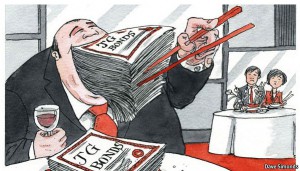Ana Patricia Botin becomes the most powerful woman in European banking, succeeding her father as chairman of Banco Santander SA. (SAN)
Santander’s board named Botin, 53, to the top executive post at Europe’s second-biggest bank by market value. Botin replaces her father, Emilio, who died of a heart attack Sept. 9 at the age of 79.
Ana Botin, the eldest of six children with 26 years of service at Santander, takes over at the bank with 1.2 trillion euros ($1.6 trillion) of assets and lending operations in markets from the U.K. to Brazil, the U.S. and Poland as well as Spain. The Botin family owns 2 percent of the bank and has helped run it since at least 1895.
“Family ownership has been a blessing,” said Peter Braendle, who manages 500 million euros in European equities, including Santander, at Swisscanto Asset Management AG in Zurich. “Ana has had a preparation that didn’t start five years ago. It began a long time ago and it was clearly very carefully planned.”
After joining Santander in 1988, she led acquisitions in Latin America in the 1990s and ran the Banesto Spanish retail unit before becoming CEO of Santander’s U.K. unit in 2010. The British business has been driving the bank’s return to earnings growth as Santander’s home market emerges from an economic slump.
Santander shares have climbed 42 percent since Marin was named CEO, compared with an 19 percent gain in the benchmark STOXX Europe 600 Banks Index over the same period.
The mother of three also said she wanted women to have the same opportunities as men. At Banesto, which she was running at the time, she tried to avoid having the bank hold meetings after 7 p.m. to prevent disruption to families.
She was educated at Santander’s Slaves of the Sacred Heart school and also in Switzerland and the U.K. and excelled at golf, becoming Spain’s junior champion in 1973 and 1974. She speaks five languages and graduated in economics from Bryn Mawr College in Pennsylvania.
In her new post, she’s assuming the most senior executive role by a woman at a large European bank. Lenders in Europe had almost no women in their top management teams at the onset of the financial crisis. While that is changing, their corporate-suite rise has been slower than in industries such as consumer goods and energy, McKinsey & Co. data show.
At the euro-area’s 10 largest banks by market value, women held about 5 percent of key executive jobs as of February, according to their filings. That was a third of the proportion at their 10 largest U.S. counterparts, which had 16 percent. Still, no woman has landed a chief executive job at any of the 10 largest U.S.-based banks that aren’t subsidiaries of foreign lenders.
Botin took over the U.K. unit after Antonio Horta-Osorio resigned to become CEO at Lloyds Banking Group Plc. Lower funding costs and efforts to win market share in higher-yielding small-business loans have propelled profits at the unit, which is now Santander’s biggest earner, contributing a fifth of profit compared with 19 percent for Brazil.










